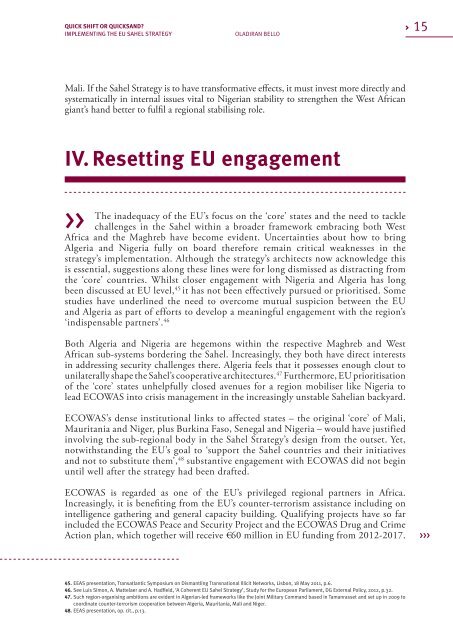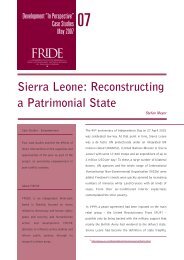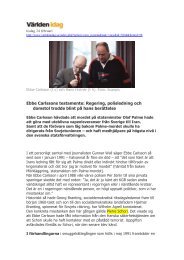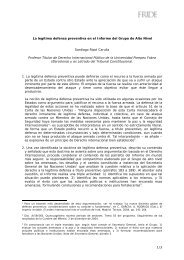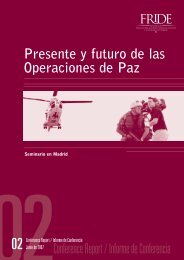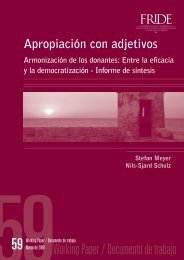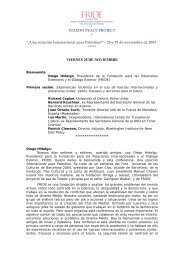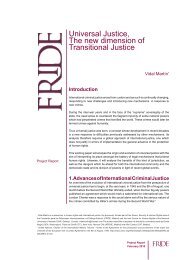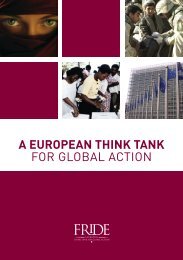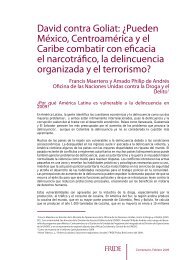Quick Fix or Quicksand? Implementing the EU Sahel Strategy - FRIDE
Quick Fix or Quicksand? Implementing the EU Sahel Strategy - FRIDE
Quick Fix or Quicksand? Implementing the EU Sahel Strategy - FRIDE
You also want an ePaper? Increase the reach of your titles
YUMPU automatically turns print PDFs into web optimized ePapers that Google loves.
QUICK SHIFT OR QUICKSAND?<br />
15<br />
IMPLEMENTING THE <strong>EU</strong> SAHEL STRATEGY OLADIRAN BELLO<br />
Mali. If <strong>the</strong> <strong>Sahel</strong> <strong>Strategy</strong> is to have transf<strong>or</strong>mative effects, it must invest m<strong>or</strong>e directly and<br />
systematically in internal issues vital to Nigerian stability to streng<strong>the</strong>n <strong>the</strong> West African<br />
giant’s hand better to fulfil a regional stabilising role.<br />
IV. Resetting <strong>EU</strong> engagement<br />
The inadequacy of <strong>the</strong> <strong>EU</strong>’s focus on <strong>the</strong> ‘c<strong>or</strong>e’ states and <strong>the</strong> need to tackle<br />
challenges in <strong>the</strong> <strong>Sahel</strong> within a broader framew<strong>or</strong>k embracing both West<br />
Africa and <strong>the</strong> Maghreb have become evident. Uncertainties about how to bring<br />
Algeria and Nigeria fully on board <strong>the</strong>ref<strong>or</strong>e remain critical weaknesses in <strong>the</strong><br />
strategy’s implementation. Although <strong>the</strong> strategy’s architects now acknowledge this<br />
is essential, suggestions along <strong>the</strong>se lines were f<strong>or</strong> long dismissed as distracting from<br />
<strong>the</strong> ‘c<strong>or</strong>e’ countries. Whilst closer engagement with Nigeria and Algeria has long<br />
been discussed at <strong>EU</strong> level, 45 it has not been effectively pursued <strong>or</strong> pri<strong>or</strong>itised. Some<br />
studies have underlined <strong>the</strong> need to overcome mutual suspicion between <strong>the</strong> <strong>EU</strong><br />
and Algeria as part of eff<strong>or</strong>ts to develop a meaningful engagement with <strong>the</strong> region’s<br />
‘indispensable partners’. 46<br />
Both Algeria and Nigeria are hegemons within <strong>the</strong> respective Maghreb and West<br />
African sub-systems b<strong>or</strong>dering <strong>the</strong> <strong>Sahel</strong>. Increasingly, <strong>the</strong>y both have direct interests<br />
in addressing security challenges <strong>the</strong>re. Algeria feels that it possesses enough clout to<br />
unilaterally shape <strong>the</strong> <strong>Sahel</strong>’s cooperative architectures. 47 Fur<strong>the</strong>rm<strong>or</strong>e, <strong>EU</strong> pri<strong>or</strong>itisation<br />
of <strong>the</strong> ‘c<strong>or</strong>e’ states unhelpfully closed avenues f<strong>or</strong> a region mobiliser like Nigeria to<br />
lead ECOWAS into crisis management in <strong>the</strong> increasingly unstable <strong>Sahel</strong>ian backyard.<br />
ECOWAS’s dense institutional links to affected states – <strong>the</strong> <strong>or</strong>iginal ‘c<strong>or</strong>e’ of Mali,<br />
Mauritania and Niger, plus Burkina Faso, Senegal and Nigeria – would have justified<br />
involving <strong>the</strong> sub-regional body in <strong>the</strong> <strong>Sahel</strong> <strong>Strategy</strong>’s design from <strong>the</strong> outset. Yet,<br />
notwithstanding <strong>the</strong> <strong>EU</strong>’s goal to ‘supp<strong>or</strong>t <strong>the</strong> <strong>Sahel</strong> countries and <strong>the</strong>ir initiatives<br />
and not to substitute <strong>the</strong>m’, 48 substantive engagement with ECOWAS did not begin<br />
until well after <strong>the</strong> strategy had been drafted.<br />
ECOWAS is regarded as one of <strong>the</strong> <strong>EU</strong>’s privileged regional partners in Africa.<br />
Increasingly, it is benefiting from <strong>the</strong> <strong>EU</strong>’s counter-terr<strong>or</strong>ism assistance including on<br />
intelligence ga<strong>the</strong>ring and general capacity building. Qualifying projects have so far<br />
included <strong>the</strong> ECOWAS Peace and Security Project and <strong>the</strong> ECOWAS Drug and Crime<br />
Action plan, which toge<strong>the</strong>r will receive €60 million in <strong>EU</strong> funding from 2012-2017.<br />
45. EEAS presentation, Transatlantic Symposium on Dismantling Transnational Illicit Netw<strong>or</strong>ks, Lisbon, 18 May 2011, p.6.<br />
46. See Luis Simon, A. Mattelaer and A. Hadfield, ‘A Coherent <strong>EU</strong> <strong>Sahel</strong> <strong>Strategy</strong>’, Study f<strong>or</strong> <strong>the</strong> European Parliament, DG External Policy, 2012, p.32.<br />
47. Such region-<strong>or</strong>ganising ambitions are evident in Algerian-led framew<strong>or</strong>ks like <strong>the</strong> Joint Military Command based in Tamanrasset and set up in 2009 to<br />
co<strong>or</strong>dinate counter-terr<strong>or</strong>ism cooperation between Algeria, Mauritania, Mali and Niger.<br />
48. EEAS presentation, op. cit., p.13.<br />
>>>


